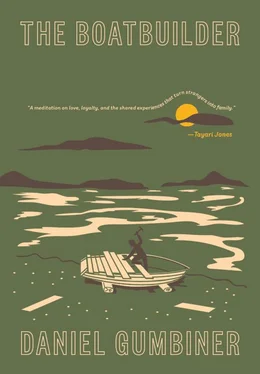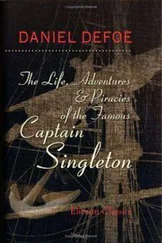Before they could begin building JC’s sloop, however, they needed to mill more wood. Alejandro milled all of the wood he used to build boats with an Alaskan chainsaw mill. His old boatbuilding mentor, Orhan, had designed the mill, which featured a simple handle that was attached to the chainsaw with two long cords. Using a choke-style throttle, Alejandro ran the mill at a high rpm to prevent the chainsaw from stalling mid-cut. It wasn’t as clean or accurate as the machinery used at a proper sawmill, but it was portable, and it allowed them to harvest trees along any roadside in the county.
The most important part of milling wood, Alejandro explained, was finding the right tree. Often, they were able to scavenge wood, to mill a tree that had already fallen on some rancher’s property. But regardless of whether they cut down the tree themselves or scavenged it, it was crucial to select the perfect tree, because milling took several days, and if you chose poorly, it could end up being a huge waste of time.
“We’re like sushi chefs,” Alejandro said. “We need the finest materials. The tree really has to be just right.”
The first time Berg went scouting for wood with Alejandro, they drove up into the hills behind Talinas. Alejandro parked the car in a turnout on Kehoe Road and they walked along Bass Creek. He pointed out different species of plant as they hiked next to the creek. White alder, big-leaf maple, ferns, coffeeberry shrub.
Al Garther owned all of this land, Alejandro said, and he let them mill on it. Al had made his money in some sort of Asian-clothing-marketing concern that Alejandro chose not to ask too many questions about. Al lived in a house at the northernmost end of the property and rented the house on the southwest corner of the property to Leanne Korver, the local Pilates teacher and the mother of Demeter, the woman Uffa had begun seeing. Berg hadn’t spent that much time hanging out with Demeter but Uffa was clearly smitten.
“She’s a mystic alpha queen born under a wolf moon,” he’d told Berg the other day.
Alejandro hobbled along the banks of the creek and Berg followed after him. On occasion Alejandro paused to study the bark of a pepperwood tree. He needed one that grew straight up, he said, and had no wind twist and few branches. These types of trees were usually found on the northern slopes of hills, where trees had to grow very quickly in order to reach the sun and, as a result, could not waste energy creating limbs. Trees like this produced straight wood that flexed the proper amount and had few knots.
Berg found one good pepperwood tree but it was not close enough to the road for the wood to be milled and then feasibly transported. Around midday they stopped and ate lunch: chicken salad sandwiches and pickles and molasses cookies. They drank green tea from a thermos and dangled their feet in the creek. It was cold but not too cold, like a glass of ice water left out on the counter for an hour.
Alejandro had milled several trees along this creek and it was always one of the first places he visited on a scouting expedition. The pepperwood from around here tended to be extra resistant to rot for reasons he couldn’t completely explain. When he’d first started milling, he’d performed all sorts of tests on the wood in the region. He would bury planks from different trees in the forest and then come back to examine the extent of their decay. White oak, black oak, Douglas fir, pepperwood, black locust, eucalyptus. He dropped sledgehammers on them from various heights. He soaked them in water. He had cataloged all of this work and self-published a small pamphlet called A Study of the Trees in Talinas: With a Focus on Milling, With a Special Focus on Milling for Boatbuilding. He had shown Berg a copy of the pamphlet at his house. Alejandro is many things, Berg remembered thinking, but he is not great with titles.
Berg wiped his feet dry with the sleeve of his shirt and put his boots back on. Alejandro walked several yards away from the creek, barefoot, and peed on a patch of poison oak. Then they continued to follow the creek. Every once in a while Alejandro stopped, knelt down to examine a plant or an animal track. He took clippings of Mexican tea and dandelion greens, stuffed them in his backpack.
At a certain point, the road peeled away from the creek and Berg and Alejandro followed it. As they moved away from the creek, the flora began to shift: now there was tanbark oak and madrone, a few redwoods. To their left a meadow unfolded, the grass soft and smooth like a green tablecloth stretched over the ground.
While they searched, Alejandro talked about why he thought it was important to mill their own wood. It was cheaper, for one thing, and better for the environment. But also, it made them reliant on the world around them. Alejandro was very critical of sophistication. He believed that confusion and trouble grew out of complexity. He wanted people to have an intimate relationship with their own environment. The problem, he said, was that people had become too dissociated from the circumstances and conditions of their immediate surroundings. They treated the land around them with indifference and inattention, because they did not feel like they relied on it in any substantive way.
“Many people have written about this,” he said. “But it continues to be true. We continue to live, by and large, apart from the land. If you work the land, you begin to understand how much you need it, how much it underpins your entire existence. And also,” he said, stopping by the creek and pulling out his water bottle, “you develop an affection for it. When we really pay attention to a thing, we begin to love it, and then we care for it.”
It was Berg who found the tree, hours later: a majestic pepperwood with small green leaves and very few branches. No wind twist whatsoever, if the appearance of the bark could be trusted. They took the leaves and crushed them in their hands, inhaled the sharp medicinal smell. Pepperwoods were also known as headache trees, Alejandro explained, because their scent was thought to both provoke and cure headaches, depending on who sniffed them.
“This is the one,” Alejandro said, pleased but exhausted. “This is a beautiful tree, Berg. This is a beautiful tree.”
Alejandro tied a piece of red cloth around one of the branches so they could see it from the road. Then he hobbled over to a nearby rock and sat down gingerly. He looked to be in some degree of discomfort.
“Are you okay, Ale?” Berg asked.
“Yes, my hip’s been sore lately. I went to the doctor to check it out and he told me it might get better if we just let it alone, but man, it’s killing me right now.”
Berg thought about the fact that Alejandro would die someday. Perhaps soon. Who could say? So much would be lost when it happened. Berg could barely bring himself to consider it. It was too sad.
He set down his pack and joined Alejandro on the rock.
“Can I do anything for you?” he said.
“No, it’s fine. I just need to rest a moment.”
They sat quietly, listened to the sounds of the forest. Alejandro took out a piece of smoked trout from his backpack and broke off half of it for Berg, as if it were a chocolate bar.
“You know, Berg,” he said. “Nell told me about your concussion. I was very sorry to hear about that.”
“What did she tell you about it?”
“The whole thing: the concussion, the pain pills, rehab.”
Berg took a bite of the trout. He felt blindsided, betrayed. Why had Nell told Alejandro about all that? This had always been the problem in their relationship. Nell thought it was better to reveal everything and Berg preferred that some things remain undisclosed. Why didn’t she consider that the story of his suffering and his addiction was his to tell?
Читать дальше












